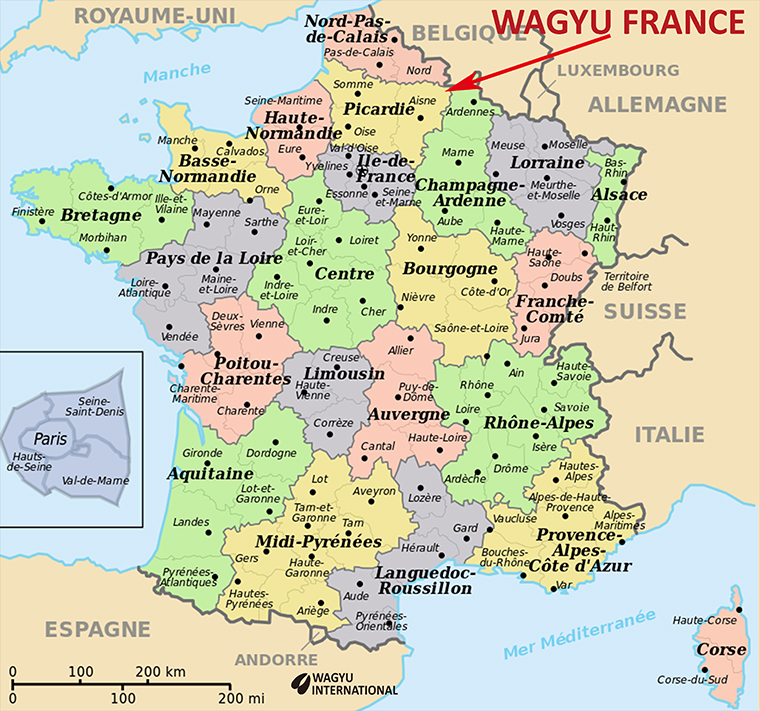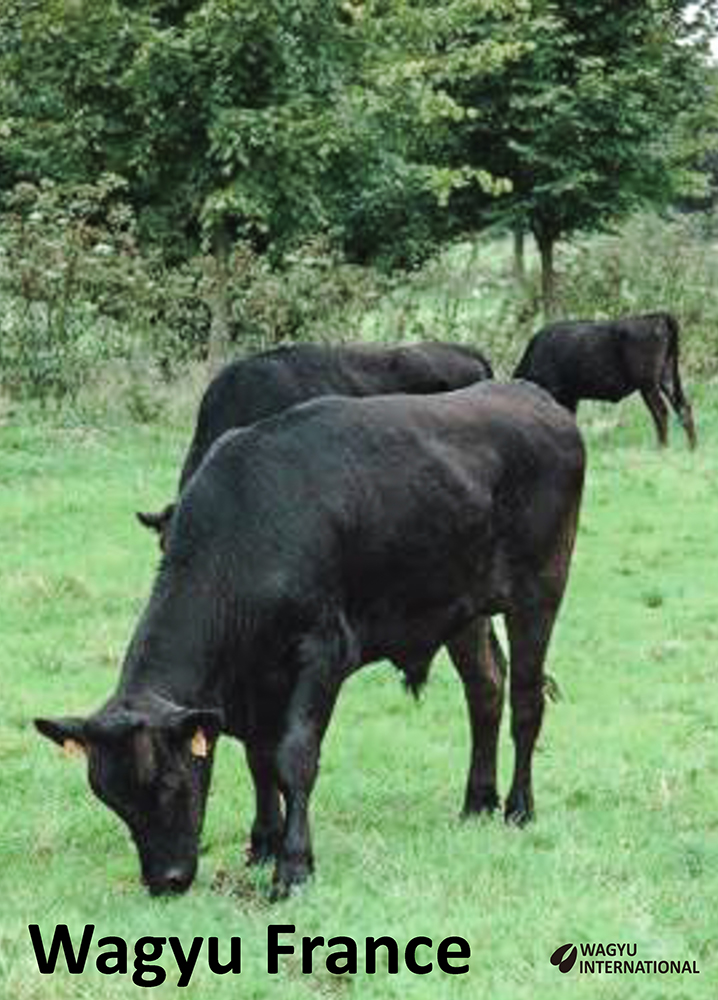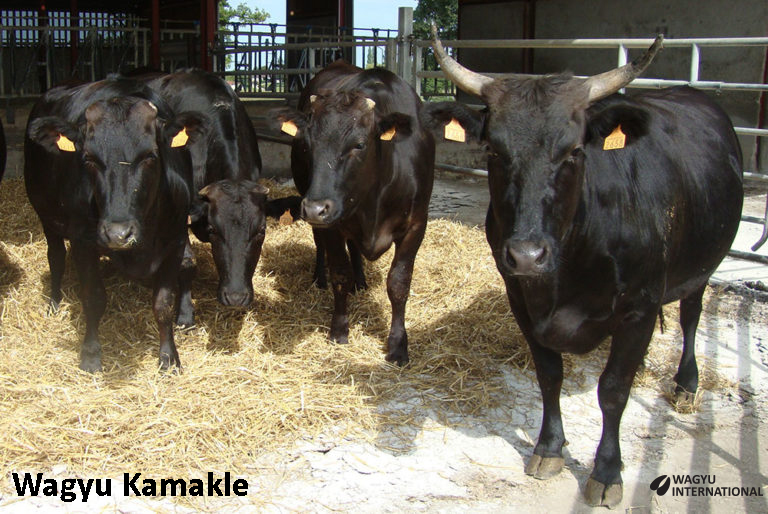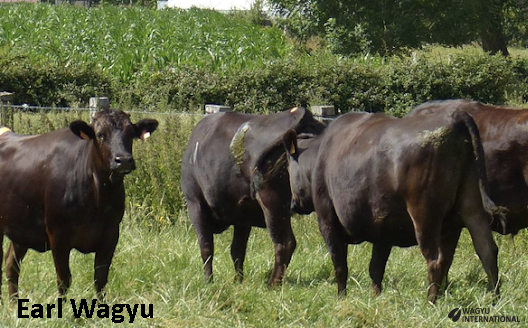Wagyu around the World - France

After tasting Kobe beef in 2002, Belgian Johan Hemelaere planned to introduce Wagyu into Europe. He imported 100 Wagyu embryos from Westholme in Australia in 2005. They were implanted in recipient Holstein cows in Belgium.
Embryos were flushed in the French herd from May 2009 by Gérard Bernard from Gènes Diffusion and the farm Domaine du Tilleul was used because the pastures offered excellent quality grass. For three years, within the WagyuFrance company, Aurore De Quick, 27, has been at the head of this large Thiérachian farm, which expanded up to a herd of three hundred animals. 
The first Wagyu carcass was marketed in 2010.
Calves are weaned and castrated between 6-8 months then grazed on the 200 hectare property. At 24 months the cattle are moved indoors to receive a finishing ration.
A liveweight of 800 kilograms at 30-36 months yields a 450 to 480 kilogram carcass. Stéphane Lerouge of Delemeat distributes Earl Wagyu France. Belgian and French chefs pay more than €350 per kilogram for some cuts but the overall price per carcass determines profitability. An average of €20 per kilogram grosses €9,000 after 30 months.
Two cousins, Alexis Merlot and Antoune Roussel, run a farm between the Baie de Somme and the Baie d'Authie in Picardy. There are 130 dairy cows and potatoes, wheat, carrots, salsify and beets are grown. 
There are 70 acres of pasture. In 2009 they spent six months in Australia learning about Wagyu and imported 12 embryos. Two years later another 60 were imported and now they have one of the largest Wagyu herds in France called 'Wagyu des deux Baies' (Wagyu of the Bays).
Steers are raised on pasture until they are 2 years old, then are fattened for 450 days with a diet based on cereals, rapeseed and linseed cake. The beef is sometimes sold for up to 300 euros per kilo to butchers or restaurants in the region and they also have an online sales site.
The Kamakle Farm was created in 2011 by Philippe Prévost and his wife. All animals are born and raised on the farm were they are fed mainly from the farm with grass from natural pastures during the growing season (March to November), then hay and cereals in winter.
Earl Wagyu is produced in the heart of the Pays de Bray by two veterinarians and a Normandy breeder. 
A field day was hosted by Johan Hemelaere in September 2013 and fifteen Wagyu breeders aatended, including Gérard Bernard. It was decided that a code needs to be created to enable an association to be registered through the Institute of Livestock at the Ministry of Agriculture.
In 2015, four Wagyu breeders in France created the “l'association française des éleveurs de Wagyu (French Association of Wagyu Breeders)”. This association aims to promote the breed in France, to preserve the pure lineage, to maintain and quantify the quality in the market.
Wagyu has been subsequently recognized as a cattle breed in France.
The association intends to establish a certification system which will be issued to each purebred animal slaughtered. A grading system will also be put in place to certify the unique marbling of French Wagyu.
By 6th March, 2020 the number of breeders in the association had increased to 26 breeders and 931 Wagyu had been registered. Wagyu, is still relatively unknown in France, and objectives were set for promotion of the breed and for breeders, through their choice of genetics, among other things, to improve the quality of the meat - especially the marbling.
Office bearers of the association are: Prevost Philippe (Président), Ploux Nicolas (Vice président), Moreau Sébastien (Secrétaire), Rivery Jean-Pierre (Vice secrétaire), Alexis Merlot (Trésorier), Alain Lemoine and Xavier Lallemand (Vice trésorier) and Sébastien Gombert and Legaignoux Vincent (Administrateur).Wagyu Genetics
The following semen is recommended for use in Fullblood Wagyu breeding or Wagyu cross / Fullblood production in Europe:
| NAME OF ANIMAL | COLOUR | TYPE | CONTACT |
| Capital Country Apex II R5 | Black | Semen | Wagyu Genetics Jerathe |
| Circle8Bulls Q122 | Black | Semen | Wagyu Genetics Jerathe |
| Lisheen N23 | Black | Semen | Lisheen Wagyu |
| Lisheen P26 | Black | Semen | Lisheen Wagyu |
| Lisheen Q39 | Black | Semen | Lisheen Wagyu |
| Mayura Pioneer | Black | Semen | Wagyu Genetics Jerathe |
| Trent Bridge F115 | Black | Semen | Wagyu Genetics Jerathe |
| WG Hirashiget 045 | Black | Semen | Wagyu Genetics Jerathe |
More information
Association des éleveurs de Wagyu français
Wagyu France website
